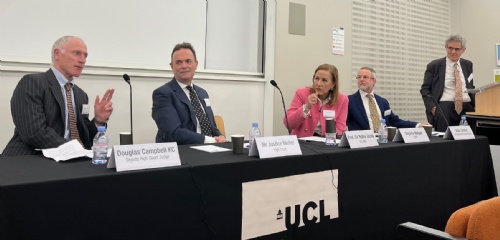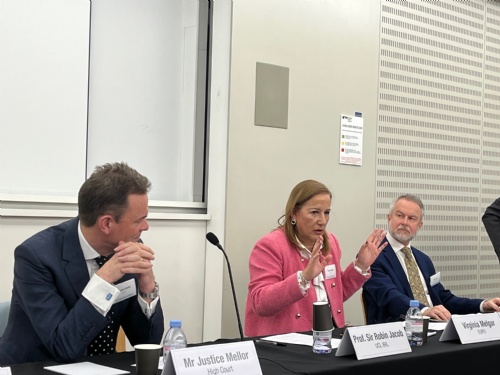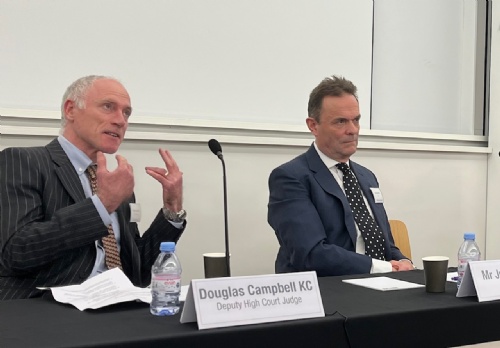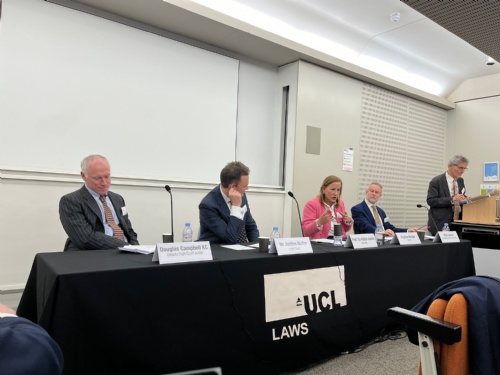Now in its twelfth year, Class 46 is dedicated to European trade mark law and practice. This weblog is written by a team of enthusiasts who want to spread the word and share their thoughts with others.
Click here subscribe for free.
Who we all are...
Question the Trade Mark Judges 2024
 MARQUES and UCL-IBIL hosted the annual “Question the Trade Mark Judges” event in London on Wednesday 13 March with an in-person and online audience of trade mark lawyers, brand owners, professors and students. About 90 people attended in person and another 45 online.
MARQUES and UCL-IBIL hosted the annual “Question the Trade Mark Judges” event in London on Wednesday 13 March with an in-person and online audience of trade mark lawyers, brand owners, professors and students. About 90 people attended in person and another 45 online.
The judges taking part were Deputy High Court Judge Douglas Campbell KC, High Court Judge Mr Justice Mellor, Virginia Melgar of the EUIPO Boards of Appeal and Allan James, Senior Hearing Officer at the UK IPO. The discussion was chaired by Professor Sir Robin Jacob.
Roland Mallinson, MARQUES Executive Board member, welcomed attendees and reminded the audience about the work of the MARQUES Amicus Curiae Team. He encouraged parties looking for support from MARQUES in both EU and national cases to approach him or the Team as early as possible.
The questions addressed by the judges covered various issues affecting both EU and national cases, and generated plenty of discussion between the panel and the audience.
Being a judge
Several questions touched on the experience of being a judge, including how it is being changed by technology.
 The first question concerned whether judges enjoy their cases being reported and whether they welcome public scrutiny. The panel noted that IP decisions often generate debate, which is welcome, but it is not possible for judges to engage in that debate and maybe a policy is needed. Allan James noted that it can be infuriating when parties say more to the media than they did to the tribunal, or highlight points that were simply not raised in the litigation. In general, judge have to try to stay above the fray and not be distracted by publicity.
The first question concerned whether judges enjoy their cases being reported and whether they welcome public scrutiny. The panel noted that IP decisions often generate debate, which is welcome, but it is not possible for judges to engage in that debate and maybe a policy is needed. Allan James noted that it can be infuriating when parties say more to the media than they did to the tribunal, or highlight points that were simply not raised in the litigation. In general, judge have to try to stay above the fray and not be distracted by publicity.
In response to another question, the panel discussed the process of deciding and writing judgments. They acknowledged that there are cases where they have changed their mind when they started writing the judgment or reviewing the evidence.
They also explained how judges can learn from each other. At the UK IPO, said Allan James, there is a peer review process whereby hearing officers can point out inconsistencies. At the High Court, judges may pop in to each other’s offices to discuss general concepts, particularly in areas they are less familiar with.
At EUIPO, Boards sit in panels of three but Virginia Melgar said that it is not uncommon for members to check cultural or linguistic concepts with other colleagues, given that the Office is working in 23 languages and covering 27 countries. In one case that concerned a Finnish region, for example, she consulted a Finnish colleague.
The impact of AI on judges and parties is an important issue. Virginia Melgar said the EUIPO has created a technology watch group, with all services represented including the Boards of Appeal. One thing she has already seen is submissions that are clearly generated by AI and/or machine translation, which sometimes include obvious errors (such as referring to the “Board” as the “Senate”). While AI can be used to make decisions better, it needs to be under human control, she said.
 Douglas Campbell KC pointed out that AI can be useful in triaging incoming cases to ensure the right time is allocated, but Mr Justice Mellor noted that parties using AI can be dangerous – and if people use generative AI in submissions they should expect them to be rejected.
Douglas Campbell KC pointed out that AI can be useful in triaging incoming cases to ensure the right time is allocated, but Mr Justice Mellor noted that parties using AI can be dangerous – and if people use generative AI in submissions they should expect them to be rejected.
Substantive issues
The judges also addressed several current substantive issues in trade mark law.
There was an interesting discussion about the role of post-sale confusion. The panel agreed that it is part of the law, even if the law has come quite a long way from protecting the essential function of a trade mark: if there is confusion, even post-sale, that can still be damaging to brands. But the panel agreed that it should not be allowed to lead to more speculative arguments.
Can you be too famous to be confusing? This was a question raised in the Picasso v Picaro case and which has been causing brand owners some concern. The panel agreed this was a difficult issue because, as Virginia said, the CJEU has taken two different positions on family names, and the Boards can follow either one. Some members of the panel were sceptical about the neutralization doctrine, which can mean for example that conceptual similarities override other aspects to dictate the outcome on similarity, even before a consideration of the likelihood of confusion.
One tricky question the judges all identified was defining the average consumer in trade mark cases, for example where there is more than one relevant group of consumers. They are also aware that parties may want the relevant consumer to be narrowly defined for proving reputation or acquired distinctiveness but construed more broadly when enforcing the marks (to avoid a higher level of attention being applied to a specialist market). For example, is the relevant consumer for a trade mark for a car all consumers or just car buyers?
Practical questions
The practical issues addressed by the judges included interim injunctions, evidence such as social media and surveys, and behavioural science.
 The panel and audience suggested various reasons why there are few applications for interim injunctions today. These included: fewer pirates, more sophisticated analysis at the interim stage, expense, lack of commercial need, the impact of speedy trials, and unpredictability. It was noted that interim interdicts in Scotland can now cover the whole UK (that had been in doubt before), but the process of recovering costs in such cases was not as streamlined as in the English and Welsh courts.
The panel and audience suggested various reasons why there are few applications for interim injunctions today. These included: fewer pirates, more sophisticated analysis at the interim stage, expense, lack of commercial need, the impact of speedy trials, and unpredictability. It was noted that interim interdicts in Scotland can now cover the whole UK (that had been in doubt before), but the process of recovering costs in such cases was not as streamlined as in the English and Welsh courts.
This topic raised the question of how to reduce litigation costs in England and Wales. Mr Justice Mellor said ultimately reducing cost is the responsibility of the parties and there are opportunities available to them, including the new £500,000 cost cap for patent cases in the High Court. Reference was also made to the IPEC Small Claims Track option, where injunctions can be granted at hearings before specialist IP judges, but compensation awards are capped at £10,000 and no (or very limited) costs are awarded against the loser.
Social media is now a routine part of evidence, but can create a lot of noise. For example, just claiming to have a certain number of followers is not useful unless the party can show where they are and why they are relevant. It is no substitute for market share or turnover evidence, said Allan James. However, social media can provide useful information on dates and origin.
 EUIPO also takes a sceptical approach to social media, particularly if it is used to show proof of reputation. A recent example was a multimedia trade mark application by Salt Bee based on acquired distinctiveness, which claimed 14 million viewers but lacked information on the date and location of the views.
EUIPO also takes a sceptical approach to social media, particularly if it is used to show proof of reputation. A recent example was a multimedia trade mark application by Salt Bee based on acquired distinctiveness, which claimed 14 million viewers but lacked information on the date and location of the views.
Surveys are also treated with caution, especially when it comes to likelihood of confusion – though as Douglas Campbell KC said, clients like them even if the courts sometimes view them as useless.
The final question was whether the courts need to take more account of behavioural science, particularly regarding colour/shape/packaging marks and lookalikes. This prompted a lot of discussion among the panel and audience about whether the courts place too much emphasis on just the brand name and not enough on other aspects of branding, including colour and shape. This discussion continued during the rest of the evening over drinks.
Posted by: Blog Administrator @ 20.58Tags: UCL-IBIL, judges, EUIPO,


 Sharing on Social Media? Use the link below...
Sharing on Social Media? Use the link below...Perm-A-Link: https://www.marques.org/blogs/class46?XID=BHA5258

